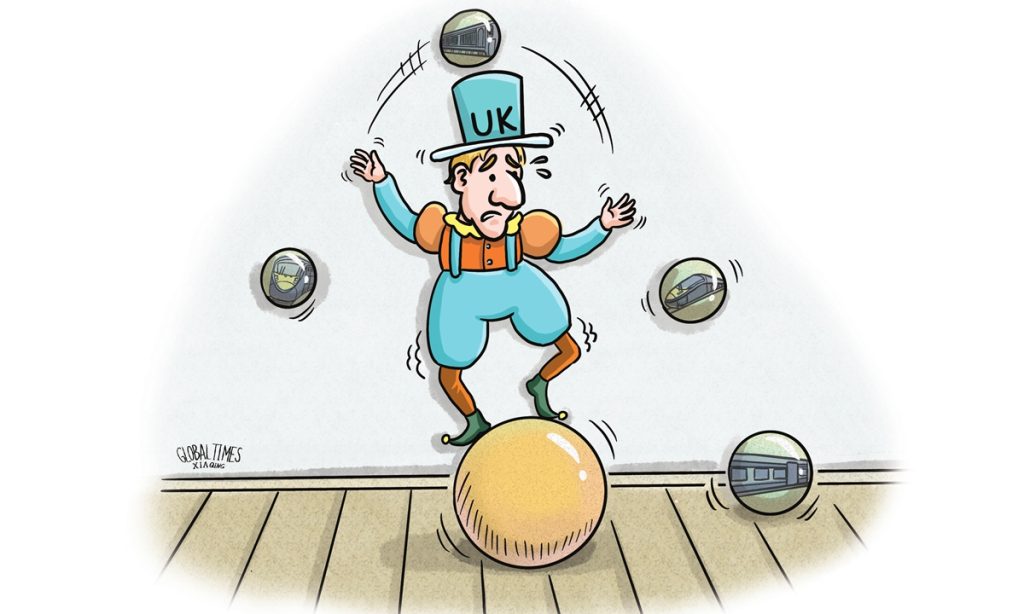Expensive high speed railway farce of UK shows it isn’t a competitor to China

In the 19th century, Britain was the nation which invented the railway. The landmark invention of the steam engine, known as "Stephenson's Rocket," was a creation which revolutionized the world and became a pinnacle of building the modern, industrialized world, connecting nations and enabling trade like never before. It was through the genius of this innovation that Britain excelled against its competitors and established itself as a global empire, a scientific, technological and military giant which allowed it to dominate and subjugate countless countries, including China.
Yet, Britain today pales in comparison to its historical achievements, as it struggles to even muster the organization, funding and political will to build a second high speed railway. This project, known as High Speed 2 (HS2), has proven to be one of the most controversial, politically contested and expensive infrastructure projects in British history, with a report from Channel 4 stating its costs could spiral upward to 108 billion pounds ($131.6 billion). The railway was designed to connect Britain's largest two cities, London and Birmingham, cutting transportation time to just an hour, but it was also envisioned to extend to other major cities including Manchester, Leeds, Newcastle and Edinburgh, connecting all the economic centres of the country.
That isn't happening. As the costs of construction continue to grow, and as the date of completion continues to get pushed back, Prime Minister Rishi Sunak has lost the political will to pursue it and decided to effectively scrap the northern link, instead proposing to shoehorn the trains onto existing lines.
There are several factors which have contributed to this scaling back, but all are the government's fault. This includes disastrous policy choices including full-throttle escalation of the war in Ukraine, which the government has devoted billions to, and the subsequent onslaught of inflation and economic stagnation, mismanagement of the COVID-19 pandemic, but also more subtly, the government's decision to, at the behest of the US, pursue an antagonistic foreign policy toward China against its national interests.
How are China and HS2 linked? First of all, at the end of 2019, the Boris Johnson government proposed to the press that China Railway Corp be used as the contractor for HS2. This was the most effective, reliable and cheapest option available. Not only would the project have been completed far earlier, but it would have also been far less expensive. The following year, Britain reset its foreign policy on China at the influence of the US, and the whole thing went out the window. With that policy shift, Britain began effectively sabotaging its own infrastructure development to suit US preferences. The costs of Britain banning Huawei from its 5G network, to take just one example, have been astronomical.
China's high speed railway record speaks for itself. Meanwhile, Britain is struggling to connect just two major cities just 117 miles (188 kilometres) apart, China has built a comprehensive high speed railway network within the scope of just 15 years, which as of 2022, spans 42,000 kilometres and is still growing. It is possible to travel across the entire country in just seven hours from Shenzhen to Beijing. In 25 years, Britain has only managed to complete one high speed network (HS1), which is in fact a transnational route which goes to France, the Netherlands and Belgium, making it a joint collaboration rather than a distinctly "British" achievement.
The fundamental reason behind Britain's failure to move ahead with high speed railway is that its infrastructure is a series of privately owned, for-profit franchises, without any subsidies, which substantially drives up the costs and also limits investment in the infrastructure simultaneously. Even without considering the High Speed Rail, the quality of British railways is astonishingly poor and behind most of its European counterparts. This model has also been bad for the workers, which has led to routine industrial action and strikes throughout the year of 2022-23, making services unreliable. This contrasts sharply to China's state-led model of development which is superior to the British railway system in every single way.
This makes the comparison ironic given that Britain sees China as a "competitor" and a "threat to its economic security." Britain is a stagnating, declining country while China is the world's second largest economy, and rather than learning from China's development successes and courting Chinese investment, the UK has made the bizarre choice to "cut its nose off to spite its face" and antagonise Beijing to suit US interests.
But what have they got to show for it? The answer is a single high speed rail route spanning into the cost of more than 100 billion pounds which has taken decades to build and has to be scaled back from its original plans. This is the country which invented the railway, but now finds itself falling behind at an alarming rate. This means shunning Chinese companies was one of the most expensive and short-sighted decisions taken by politicians in recent years, among many other things.